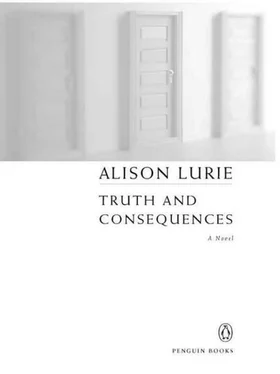“So how is everything going?” she asked politely, to break the silence and distract herself from these familiar self-accusations.
“All right. Delia’s having one of her migraines, though.”
“Oh, that’s too bad,” Jane said, struck by the use of the possessive, as if the migraines were Delia’s personal property. “I’m very sorry,” she added, conscious that she was not especially sorry. The more she saw of Delia Delaney, the less she cared for her. When Delia wasn’t demanding some special service or equipment, she was interfering with things at the Center in other ways. A few days ago, for instance, she had taken, or rather openly stolen, a whole ream of expensive pale-green paper (normally used only for posters and announcements) from the supply cupboard. Also, after Susie had received a polite written apology from Charlie Amir, which should have closed last month’s unfortunate incident, Delia had completely spoiled its effect. She had done this by telling Susie that the bunch of roses that accompanied the note conveyed a message in the Victorian Language of Flowers: dark-red roses, appropriately, meant Bashful Shame, but the ferns that came with them signified Fascination. “He’s ashamed of what he did, but he’s also fascinated by you, Susie,” Delia had said, laughing. “When he kissed you, he couldn’t help himself.”
When Jane remarked that it was very unlikely that a Bosnian economist would be acquainted with this code, Delia had contradicted her. The Language of Flowers was still known all over Europe, she claimed. Anyhow, she had added, segueing into a vatic Jungian mode, these ancient symbolic meanings were innate. Even if Charlie hadn’t known what the flowers meant, they expressed what he subconsciously wanted to convey. It was meant as a joke, probably, but for the rest of the afternoon Susie had remained in a dreamy, inefficient daze. “Nobody ever sent me so many roses before,” she kept saying.
“It’s weird, you know,” Henry remarked, as if to himself. “When she’s having a migraine it’s as if Delia’s a different person. Sometimes I almost don’t recognize her.”
“Yes, it’s—” Jane said involuntarily, then checked herself, hoping she had given nothing away. “Does Delia have migraines often?” she asked, aware that she had allowed a silence to fall.
“Fairly often.” Henry took a slow drink of cider. “They come on when she’s under stress, or when she doesn’t get what she wants. That’s my theory, anyhow.” He smiled briefly and without mirth.
“Really. And what does she want?”
“Oh, the usual things that people want. Fame, love, money.”
“Really,” Jane repeated. “But doesn’t she already have those things?”
“Not completely. Reviews often make her ill, for instance. Last night it was a piece in the Times Literary Supplement . It was favorable, mostly, but it called her the American Angela Carter. Delia said the implication was that she was a weak transatlantic copy. And it wasn’t fair either, because Angela’s tales all came out of European folklore, while most of hers are inspired by Southern popular traditions and ghost stories and American Indian legends. ‘The English are so sneaky and devious,’ she kept saying. ‘They destroy you with a thousand little needle-pricks. I can feel them now in my head.’ ”
“And she got a migraine just from that?” Jane asked incredulously. “But she’s had so many, many good reviews, and articles and letters—I know, I’ve seen her folder.”
“Yeah, but you see, Delia doesn’t feel safe unless the applause is complete. She needs for everyone in the world to love her. And usually they do.”
“Yes; I’ve noticed,” Jane said. Bill Laird’s prediction had come true, she thought. Both Mrs. Unger and Susie admired Delia immensely now, and all the Fellows except Alan seemed to have a crush on her, including Selma Schmidt.
“But it’s never enough, you see,” Henry said. “There’s always a few people here and there who don’t love Delia, however hard she tries. However brilliant and charming she is, they just won’t.” He paused to take another swallow of cider. “People like you, for instance.”
“Oh, I never said—I didn’t mean—” Jane protested.
“Of course not. But I can always tell. And so can she, usually. ‘Jane Mackenzie doesn’t like me,’ she said, just the other day. ‘How can I get her to like me?’ ”
No way, Jane thought, but said nothing. She looked at Henry and noticed that he was smiling, almost laughing. It amuses him that I don’t like Delia, she realized. Maybe it even pleases him.
“It’s not always fun being famous,” Henry said. “But somehow people want it.”
“I don’t see why,” Jane said with distaste. “All those people looking at you and talking about you all the time and printing your name in the papers.”
“You might like it,” Henry said. “You never know till you try.”
“No, I wouldn’t. I was sort of famous here in Corinth once, for a week or so, and it was just hateful.”
“Ah? How did that happen?” He smiled and leaned toward her.
“Well, it was kind of a mistake. My picture was in the local paper because I was buying a big stack of books at the library book sale. I didn’t even know they’d taken it, but it was on the front page. Everybody in town saw it, and they all said different intrusive things, even people I hardly know. They said how I must read so much I would hardly have time for anything else, or that my hair was untidy. The pharmacist in the drugstore told me I needed a haircut, and this woman in Benefits in Knight Hall said I looked very worried and unhappy; but I wasn’t unhappy at all. I only looked that way because the books were heavy and slipping.” She flushed, embarrassed. Why am I running off at the mouth like this? she thought. I hardly know this person.
“I think I know what you mean,” Henry said, and waited for her to go on, and for some reason, maybe because he was listening so carefully, she did.
“You see, if I hadn’t been in the paper nobody would have dared to tell me I looked unhappy or needed a haircut, they would have known it was none of their business. Nobody asked them to have an opinion, but they somehow thought it was their right, because I was in the paper. I don’t know how famous people can stand it. I mean, it’s no wonder Delia gets headaches.”
“No, perhaps not.” Henry was silent for a moment, looking out over the long, shimmering lake, and then back at Jane. “I wanted to be famous once, you know,” he said. “Before I saw it up close.” He shrugged and turned, glancing around at the group of musicians on the dock who were playing a ragged but cheerful bluegrass number. “This is a great place,” he said finally. “I think I’m going to come here every Saturday.”
“Why not?” Jane frowned. Before Alan hurt his back, they used to visit the market together. He would carry the basket, and often they would run into friends and acquaintances. Today Jane hadn’t seen anyone she knew well enough to speak to at length, but she had been uncomfortably aware that one of the technicians in her dentist’s office, and an elderly couple who often came to chamber music concerts in Bailey Hall, must have noticed that a strange man was accompanying her.
“You know, it kind of reminds me of home,” Henry added.
“Oh? Where is home?”
“Well. It’s in Ontario. Or was.”
“In Canada.”
“Uh-huh.”
“You’re a Canadian.”
Henry sighed. “God. The way you say that.”
“What?”
He laughed. “Oh, it’s not just you. Everyone down here says it that way. With a kind of bored, dying fall.”
“I didn’t,” Jane protested.
Читать дальше







![Кэмерон Доки - Правда и ее последствия[Truth and Consequences]](/books/79610/kemeron-doki-pravda-i-ee-posledstviya-truth-and-con-thumb.webp)




